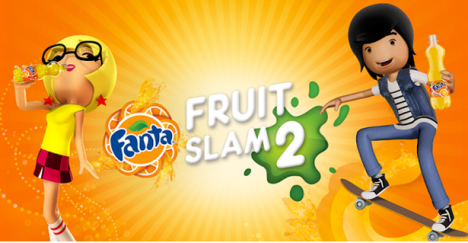Coca-Cola pulls Fanta TV ad and app after watchdog rules they targeted children
Coca-Cola has pulled a TV campaign and a mobile app for Fanta after the ad watchdog ruled they broke marketing rules by being aimed at children
The complaints to the Ad Standards Board (ASB) were made by the Obesity Policy Coalition (OPC) who argued the TV ad and the Fanta ‘Fruit Slam 2’ app breached the Responsible Children’s Marketing Initiative, which Coca-Cola is a signatory to, and allows only the marketing of food or drinks to kids which are a healthy dietary choice.
https://www.youtube.com/watch?v=tJf9KBy4A7U&feature=youtu.be
Ad courtesy of Savvy Media Monitoring
The OPC told the ASB: “As a signatory to the RCMI, Coca Cola has committed not to advertise its products to children under 12 years in media unless those products represent healthier dietary choices, consistent with established scientific or Australian government standards.”
 The body argued the TV campaign is a “communication directed primarly to children” and it “does not promote healthy dietary habits or physical activity”, citing its “whimsical, playful animation” and “emphasis on imagery such as a rollercoaster” as evidence of that.
The body argued the TV campaign is a “communication directed primarly to children” and it “does not promote healthy dietary habits or physical activity”, citing its “whimsical, playful animation” and “emphasis on imagery such as a rollercoaster” as evidence of that.
It argued these “evocative aspects” of the ad would “strongly appeal to children’s sense of playfulness”.
In relation to the app, the body argued it was “misleading or likely to mislead or deceive as to the content of Fanta”.
Coco-Cola defended the TV campaign saying its media buyer, UM, “buys advertising in accordance with The CocaCola Company’s Responsible Marketing Policy” and in accordance with that policy UM “did not place the Advertisement in any television programs where the audience is predominantly children”.
Responding to the complaints about the app, Coca-Cola South Pacific asserted it did not create, promote or publish the app and provided a response on behalf of the Coca-Cola Company located in Atlanta, Georgia, USA.
It also said the app, like the TV campaign, was not “primarily directed to persons under 12 years of age. Rather, it is directed primarily to teens aged between 15 – 17 years.”
While the board ruled the TV campaign “was not broadcast in a program where the audience is predominantly children or the program is directed primarily to children”, it did rule many of the visuals would appeal, and was targeting, younger children rather than older teenagers or young adults.
“Theme parks are aimed at a broad range of the community but considered that by using animated characters riding on a roller coaster and then jumping in to a pool filled with bubbles the advertisement is targeting younger children rather than older teenagers or young adults,” the ASB said in its ruling.
The board also ruled the group of cartoon characters in the ad, who are intended to represent young teenagers, are “more likely to appeal to younger children who aspire to be teenagers and would consider teenagers as role models”.
It was the board’s view “the visuals of the teenage characters are visuals that are directed primarily to children under 12”.Because of this the board ruled it breached the Responsible Children’s Marketing Initiativecode.
In a separate ruling on the Fanta app, the board dismissed the complaint the app was misleading, however, similar to the TV campaign, the board found the app breached the Responsible Children’s Marketing Initiative.
In response to the rulings, Coca-Cola said it was “committed to marketing its products responsibly”, admitting they were “disappointed” the ASB had found the TV ad and app were “primarily directed to children”.
“This decision is not reflective of our intention. We respect, however, the decision of the ASB and undertake not to broadcast in the TVC in Australia going forward,” Coca-Cola said.
“We respect, however, the decision of the ASB and have arranged for the App to be removed from iTunes Australia.”
The app was still available on Google Play as of this morning, but Coca-Cola has since confirmed it has now been removed.
The OPC welcomed the decision, with OPC executive manager Jane Martin stating: “At a time when 25% of Australian children are overweight or obese, it is extremely unethical for Coca-Cola to aggressively promote their high sugar products to children in this manner, in breach of their own undertakings.
“We are very pleased to see that our complaints to the ASB have been upheld and that Coca-Cola has removed the ad from television and the app from the iTunes store, although the app is still available from Google Play.”
Miranda Ward


Stand by for the usual posts about a “Nanny State” and “We should be allowed to advertise whatever we like”…
But I love the taste of Fanta.
Hmm this one has me f***ed up ethically,
So morally I feel like I’m down with branded content,
But at the same time, I think it’s horrible to manipulate children who can’t decifer ad messages.
I seemed fine having those two moralities exist until I got confronted by ACMA citing the execution as wrong because it is deceiving children.
It makes sense, I am still really excited about branded content as new wave advertising. But concious I have some pondering to do. because another way to frame ‘developing content that integrates + aligns with a product’ is ‘intentionally decieving a target audience into think your advertising is content’
Ahh we suck
Difficult situation for Coca Cola.
They’ve got themselves an unhealthy product that only appeals to people they’re duty bound not to target. Real pickle.